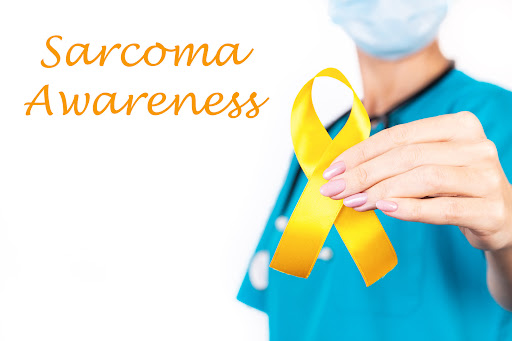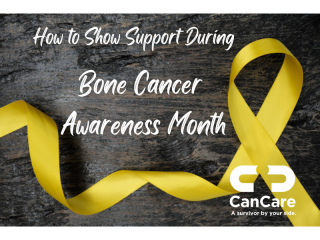How to Participate in Bone Cancer Awareness Month
Learn more about sarcoma and other types of bone cancer, and how to show your support during Bone Cancer Awareness Month in July!
Known as the “forgotten cancer,” sarcoma and other types of bone cancer are often overlooked and not discussed. During July, CanCare encourages you to show your support for Bone Cancer Awareness Month. Here is what you need to know about this type of cancer and how you can help raise awareness and provide emotional support!
What is Bone Cancer?
 In the United States, around 3,200 people are diagnosed with primary bone cancer every year. While it is rare—bone cancer makes up 0.02% of cancer diagnoses nationally—children and teens are the most affected age group. It can develop in any bone of the body but usually grows in the pelvis, arms, and legs.
In the United States, around 3,200 people are diagnosed with primary bone cancer every year. While it is rare—bone cancer makes up 0.02% of cancer diagnoses nationally—children and teens are the most affected age group. It can develop in any bone of the body but usually grows in the pelvis, arms, and legs.
Metastatic bone cancer, which originates in another area and migrates to the bone is the most common bone cancer. Along with its metastatic form, there are many types of primary and secondary bone cancers, and their classification depends on where they first grew in the body:
Genetic alterations can be related to a rare inherited genetic alteration within families but are usually random. Research is vital to uncovering the many things that remain unknown about bone cancer, which is why July has been designated as Bone Cancer Awareness Month to help spread the word and raise money for research.
Bone Cancer Treatments
Treatments vary and depend on the specific type of bone cancer a person may have, the current stage of cancer, their general health, and their personal preferences. Surgery, cryosurgery, chemotherapy, and radiation therapy are the most common treatment options.
Despite medications existing to help ease possible side effects of treatment, treatments still prove a battle for those experiencing a bone cancer diagnosis. Therefore, it is crucial to offer a shoulder to lean on for those undergoing treatments and take July as an opportunity to raise awareness of what they have to endure.
Donate to charity: A quick and effective way to participate is by donating to an organization that supports bone cancer patients.
Post on social media: A quick post about Sarcoma Awareness Month on one of your social media platforms is a great way to reach a larger audience who may be unfamiliar with bone cancer.
Attend an event: The Sarcoma Foundation of America puts on the Race to Cure Sarcoma, a 5k run, in places all around the country to raise awareness and money for bone cancer research. Finding an event like this near you is a great way to show support!

Our goal is to connect those going through a cancer diagnosis in the Houston area with a survivor who has been in their position and can be a part of their support system and offer the experience of someone who has lived the cancer journey. So, if you are in Texas and need emotional support while facing cancer, call CanCare and get in touch with a survivor or caregiver volunteer today.
What is Bone Cancer?
 In the United States, around 3,200 people are diagnosed with primary bone cancer every year. While it is rare—bone cancer makes up 0.02% of cancer diagnoses nationally—children and teens are the most affected age group. It can develop in any bone of the body but usually grows in the pelvis, arms, and legs.
In the United States, around 3,200 people are diagnosed with primary bone cancer every year. While it is rare—bone cancer makes up 0.02% of cancer diagnoses nationally—children and teens are the most affected age group. It can develop in any bone of the body but usually grows in the pelvis, arms, and legs.Metastatic bone cancer, which originates in another area and migrates to the bone is the most common bone cancer. Along with its metastatic form, there are many types of primary and secondary bone cancers, and their classification depends on where they first grew in the body:
- Sarcoma, also called primary bone cancer, is cancer that begins in the bones or other soft tissues of the body. Common subtypes include osteosarcoma, chondrosarcoma, ewing sarcoma, and others.
- Secondary bone cancers are so-called because they begin elsewhere in the body and metastasize, or spread, to the patient’s bones. Subtypes include multiple myeloma and leukemia, which begin in the bone marrow, and non-Hodgkin lymphoma, which develops in the lymph nodes.
Potential Causes of Bone Cancer
Scientists have not identified the cause of sarcoma, but most believe that certain syndromes or exposure to some harmful chemicals can increase the risk of sarcoma.Genetic alterations can be related to a rare inherited genetic alteration within families but are usually random. Research is vital to uncovering the many things that remain unknown about bone cancer, which is why July has been designated as Bone Cancer Awareness Month to help spread the word and raise money for research.
Bone Cancer Treatments

Treatments vary and depend on the specific type of bone cancer a person may have, the current stage of cancer, their general health, and their personal preferences. Surgery, cryosurgery, chemotherapy, and radiation therapy are the most common treatment options.Despite medications existing to help ease possible side effects of treatment, treatments still prove a battle for those experiencing a bone cancer diagnosis. Therefore, it is crucial to offer a shoulder to lean on for those undergoing treatments and take July as an opportunity to raise awareness of what they have to endure.
Raising Awareness For Sarcoma
Many people are unaware of sarcoma and other types of bone cancer because it is so rare. Participating in Bone Cancer Awareness Month is the best way to do your part in raising awareness for and starting conversations about bone cancer. Here are some of the many ways you can show your support during July:Donate to charity: A quick and effective way to participate is by donating to an organization that supports bone cancer patients.
Post on social media: A quick post about Sarcoma Awareness Month on one of your social media platforms is a great way to reach a larger audience who may be unfamiliar with bone cancer.
Attend an event: The Sarcoma Foundation of America puts on the Race to Cure Sarcoma, a 5k run, in places all around the country to raise awareness and money for bone cancer research. Finding an event like this near you is a great way to show support!
What to Do If Diagnosed with Bone Cancer
You or your loved ones do not have to go through a bone cancer diagnosis alone. At CanCare, we are a community of volunteer survivors and caregivers who provide emotional support and offer the strength and support you need during this difficult time.
Our goal is to connect those going through a cancer diagnosis in the Houston area with a survivor who has been in their position and can be a part of their support system and offer the experience of someone who has lived the cancer journey. So, if you are in Texas and need emotional support while facing cancer, call CanCare and get in touch with a survivor or caregiver volunteer today.


